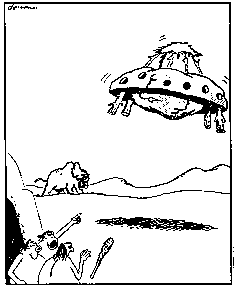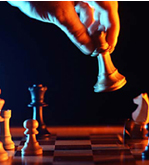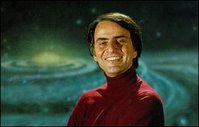It's time again for my top 20 albums of the year. I've listened to an absolute ton of music during the past 12 months, but for every CD I sampled there were an umpteen number of others I didn't get a chance to hear. Consequently, I tried to be as selective as possible.
2006 was a particularly strong year for music. Choosing a top 20 was not easy, and because there were so many good albums I decided to create an 'honourable mention' category. These are solid albums, each a special gem worthy of consideration and respect -- but not quite the cream-of-the-crop. I've also listed several disappointments and/or overrated albums from the past year.
Your feedback is welcomed. Please let me know where you agree or disagree and if I missed something! Here are my lists:
TOP 20 ALBUMS OF 2006:
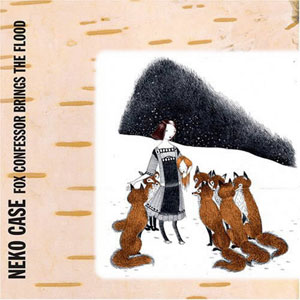 1. Neko Case: Fox Confessor Brings the Flood
1. Neko Case: Fox Confessor Brings the FloodWhile coming up with a top 20 was not easy, selecting the #1 album of the year was a no-brainer: Neko Case's
Fox Confessor Brings the Flood was by far the most spectacular release of 2006. With this album, Case has established herself as a world-class song writer, producer and vocalist.
Every track shines on this album; Case's confidence and talent as an artist has never been more obvious. Her performances are emotional, personal and powerful. The songs are sad, revealing and honest. And adding to this perfection-of-craft is her newfound willingness to step outside familiar genres, styles and conventional song structures.
The first three tracks are absolute stunners -- the kind of 1-2-3 punch you would expect on a Best Of album (
Margaret vs. Pauline,
Star Witness, and
Hold on, Hold On). These are quintessential Neko tracks that are the best examples of music that is distinctly her own -- not quite alt-country, not quite adult alternative and not quite pop.
From these opening tracks she ventures into new territory, drawing from diverse musical styles. There's a sloppy 50s era highschool dance number, a pagan rite, and a foot stomping gospel track. At no times, however, does
Fox Confessor feel disjointed or inconsistent; it's a Neko Case album from start to finish.
A beautiful album. Way to go, Neko!
 2. Isis: In the Absence of Truth
2. Isis: In the Absence of TruthThe best progressive metal album of 2006 and my #2 CD of the year goes to Isis's
In the Absence of Truth. These brooding post-metal experimentalists from Los Angeles keep pushing the envelope of what it means to be heavy. They're kind of a Mogwai meets Neurosis and Tool (who they toured with in 2006).
Absence's tracks are sonically dynamic, slow-paced with long and drawn out builds that often deliver crushing finales. Isis's arrangements thrive on repetition and evolution of structure; hidden melodies reveal themselves with each passing listen. Instruments work in counterpoint with circular rhythms.
Aaron Turner's minimalist vocals, sometimes deathy, sometimes half-sung, are placed back in the mix along with the other instruments. And the drumming, performed by Aaron Harris, is nothing less than spectacular. He relentlessly works the toms and delivers brilliant hi-hat fills.
With this, their fourth studio release, they have firmly defined the post-metal/sludge-metal sound for the early 21st century. Isis is now the most important metal band coming out of the United States.
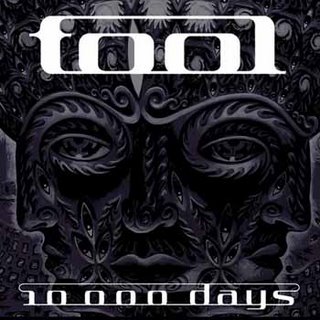 3. Tool: 10,000 Days
3. Tool: 10,000 DaysFive agonizingly long years after the release of
Lateralus comes Tool's fourth studio release,
10,000 Days. While quite possibly their weakest effort to date, this is still the kind of album that most bands can only dream about releasing. I was initially unsure about this CD and it wasn't until I starting contrasting it with other similar artists that its strengths were revealed. Make no mistake:
10,000 Days is a great album.
As always, each track is an epic journey. Maynard, still mourning the death of his mother, offers some of his most touching and personal lyrics. On
Jambi, he credits his mother for showing him the way out of his darkness: "The devil and his had me down/in love with the dark side, I found/Dabblin' all the way down/Up to my neck; Soon to drown/But you, changed that all for me, lifted me up, turned me 'round." And on the title track, in awe of his mother's unswerving religious faith after a life lived in misery, he brazenly demands that God let her into the Kingdom: "Fetch me the spirit, the son and the father/Tell them their pillar of faith has ascended/It's time now!/My time now!/Give me my/Give me my wings!" It's hard not to get goosebumps when you're listening to this stuff.
Musically, Tool has not strayed too far from the sound they established on
Lateralus. The album can be frustratingly derivative of their previous work, but they make up for it by offering great tracks and doing what they do best.
The Pot is undoubtedly the best song of 2006 and will go down as a hard rock classic.
Vicarious is their best radio single since
Aenima, and
Rosetta Stoned -- a song sung from the perspective of an alien abductee -- has quickly become a fan favourite:
Goddamn, shit the bed.
As usual, all performances are virtuosic and the production is dynamic and creative. They take their times building tracks, not afraid to take it down for extended lengths of time (take
Lost Keys for example, where 2 oscillating guitar notes are held and repeated for nearly two minutes). Their arrangements include tablas, native American vocals, and a solo performed on a talkbox. While Danny Carey, Justin Chancellor and Adam Jones rock on this album, this is clearly Maynard's
tour de force.
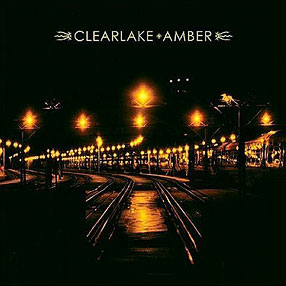 4. Clearlake: Amber
4. Clearlake: AmberI have a real soft-spot for British rock, which is why it pains me to watch a great band like Coldplay degenerate into sappy and institutionalized irrelevancy. Thankfully there's still a lot of great material coming out of the UK -- the best this year coming from Clearlake and their wonderful CD,
Amber.
This album is simple, confident and great.
Clearlake, influenced by bands like Talk Talk, My Bloody Valentine, Doves and the Beta Band, have nailed it with their third release.
Amber features solid and diverse tracks, wonderful melodies and driving rock numbers. Track highlights include the beautiful
You Can't Have Me, Neon and
Amber.
A very underrated band.
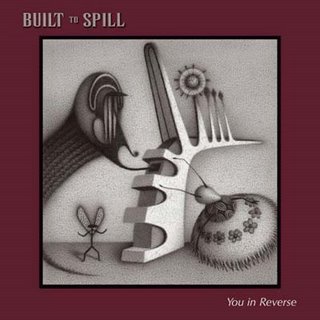 5. Built to Spill: You In Reverse
5. Built to Spill: You In ReverseWhen I heard that Built To Spill was releasing an album this year it never occurred to me that it would end up on my top 20 list (let alone my top 5). It had been five years since their last album, and with this being their 7th, I got to thinking that their best years were behind them.
You In Reverse caught me completely by surprise. This is
such a good album -- it has everything that Built To Spill fans have come to love about this band.
Firstly, as a guitar album,
You In Reverse kicks. They still sound like they're an indie band that gets carried away with extended jam sessions in the garage. The album opener,
Going Against Your Mind, rocks out for several minutes before the track actually comes together; the entire track clocks at nearly 9 minutes.
Second, the songs are simply great.
Liar,
The Wait and
Wherever You Go are brand new tracks that instantly sound like familiar BTS classics. This album also contains several mid-tempo ballads delivered with the expected emotion and skill.
This is a solid album from a classic and classy band that has now re-established itself as one of the world's best groups.
Okay, now that I've listed the top 5, I'm just going to quickly run-down the rest of my top 20:6. Jenny Lewis and the Watson Twins: Rabbit Fur Coat
7. Comets on Fire: Avatar
8. M. Ward: Post War
9. Dresden Dolls: Yes, Virginia...
10. Boris: Pink
11. The Mars Volta: Amputechture
12. Deftones: Saturday Night Wrist
13. High on Fire: Blessed Black Wings
14. Joanna Newsom: Ys
15. Thom Yorke: The Eraser
16. Mastodon: Blood Mountain
17. Mogwai: Mr. Beast
18. The Gathering: Home
19. Voivod: Katorz
20. Audioslave: Revelations
Honourable mention (listed alphabetically):Beck: Information
Bob Dylan: Modern Times
Fiery Furnaces: Bitter Tea
Ghostface Killah: Fishscale
Graham Coxon: Love Travels at Illegal Speeds
Lacuna Coil: Karmacode
Matmos: The Rose Has Teeth in the Mouth of the Beast
Muse: Black Holes and Revelations
Prince: 3121
Pure Reason Revolution: The Dark Third
Red Hot Chili Peppers: Stadium Arcadium
She Wants Revenge: She Wants Revenge
Slayer: Christ Illusion
The Dears: Gang of Losers
The Raconteurs: Broken Boy Soliders
The Twilight Singers: Powder Burns
Disappointments and over-rated albums:
Beatles: Love
Gnarls Barkley: St. Elsewhere
The Decemberists: The Crane Wife
 A couple of weeks ago Time Magazine announced its 'Person of the Year' for 2006. Much to everyone's surprise, they awarded you as person of the year. Yes, you. And me. And anyone else who contributed to the ever growing Internet based infosphere.
A couple of weeks ago Time Magazine announced its 'Person of the Year' for 2006. Much to everyone's surprise, they awarded you as person of the year. Yes, you. And me. And anyone else who contributed to the ever growing Internet based infosphere. 
